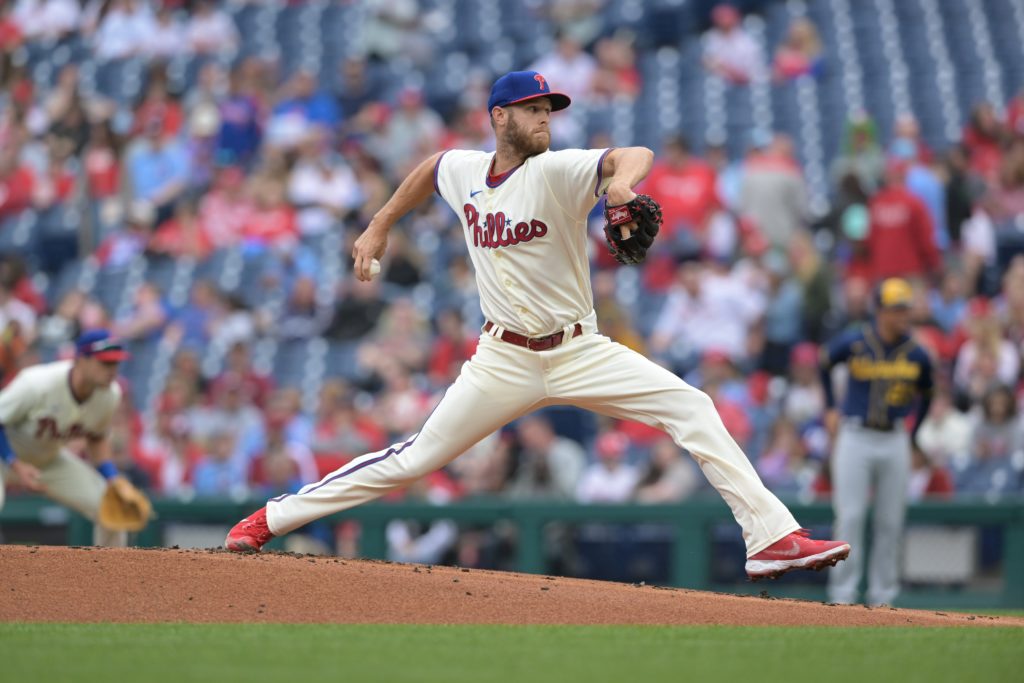Ad Disclosure
Phillies’ Disappearing Bats Can’t Bail Out Defense in Latest Loss
By Bob Wankel
Published:

The story of the Phillies’ latest loss is a pretty simple one.
An inconsistent offense that shut down after an early flicker of production wasn’t enough to overcome some critical fifth-inning defensive miscues.
In the process, a once-promising start from an improving-but-not-quite-there-yet Zack Wheeler quickly went to shit, and the Phillies will now head into a nationally-televised ESPN Sunday Night Baseball game still scuffling at 6-9 overall.
Not nice.
Anyway, let’s run through some quick observations after one that got away.
Still Looking For It
Entering play Saturday, the Phillies had done most of their offensive damage later in games. That was not the case in this one. At all.
After putting up a quick three runs on four hits through the first three innings, the Phillies’ lineup managed just three more hits over the final six frames. All three hits were singles, two of which were quickly wiped away by double plays.
In fact, the Phillies didn’t even reach second base over the final six innings.
https://twitter.com/BrodesMedia/status/1517997713970896896?s=20&t=_p95nbX9mbhD5Sq1l1heUQ
Brutal defense (I’ll get to it below) ultimately did them in, but brutal defense was always going to be part of the deal with this team.
But brutal offense? That’s not supposed to be part of the deal.
And I know all about the numbers.
The Phillies currently rank among baseball’s best teams in several key statistical offensive categories, but there has been no consistency whatsoever through 15 games. Seven times already they’ve been held to three or fewer runs.
Hard contact and elite expected outcome data from Statcast bode well as the sample size stretches out, but until this lineup gets into a sustained rhythm, it needs to find ways to scratch across runs with more frequency.
Wheeler Watch
I don’t usually spend much time looking at the radar gun, but with Zack Wheeler battling a well-documented velocity decrease through his first two starts, it had my attention Saturday afternoon.
Six days after averaging just 94.4 mph with his fastball and 93.7 mph with his sinker during a disastrous start in Miami, Wheeler showed improved velocity by averaging 95.9 mph with his fastball and 95.6 mph with his sinker against the Brewers, according to Statcast data.
He was also able to register 96+ mph a few times as his start moved into the middle innings.
“Much better today. Big improvement. I mean, I think we all saw where his stuff was today,” Phillies manager Joe Girardi said following the game. “It’s unfortunate that fourth [sic] inning got away from him a little bit because I thought he was throwing the ball really well today.”
Still, the overall results were mixed.
Wheeler breezed through the first four innings, allowing just a pair of hits while keeping the Brewers off the board.
He would then run into trouble in a messy four-run fifth inning during which he allowed five hits.
Compounding Wheeler’s struggles were a pair of junior varsity-esque plays by the Phillies’ defense.
With the Phillies protecting a 3-1 lead, Milwaukee’s Willy Adames hit a liner to left that looked like it would hang up for the third out. Instead, left fielder Kyle Schwarber had a slow read, allowing the ball to fall for a hit. He then tossed a three-hopper to the plate that failed to beat Lorenzo Cain.
https://twitter.com/BrodesMedia/status/1517981486372339713?s=20&t=hPBNbmPGU1O2MOGm-wpsWA
Two batters later, the Phillies botched a routine first-and-third situation when Jean Segura couldn’t handle a poor throw from catcher J.T. Realmuto, allowing the go-ahead run to score.
Asked following the game about his team’s defensive issues, Girardi predictably applauded the effort.
https://twitter.com/BrodesMedia/status/1517982126628605952?s=20&t=CRX2ezuvRgxJZmCSDeAivw
“Yeah, I mean, those are a lot of things. Everyone is doing their best, I mean, that’s the bottom line,” he said.
An explanation that’s sure to satisfy an increasingly impatient fan base, I’m sure.
Ultimately, neither play went down as an error, but both are plays that simply have to be a made.
As for Wheeler, he would exit after five innings and 84 pitches with his ERA sitting at an unexpectedly high 8.53 after three starts.
Through those three starts, Wheeler has allowed 12 earned runs across 12 2/3 innings pitched. Last season, he didn’t allow his 12th earned run until his sixth start with 32 innings under his belt.
Making the Best of It
https://twitter.com/BrodesMedia/status/1517971458701639680?s=20&t=VRhBNnt91EEDD8rZw-r7Qw
Odubel Herrera made his 2022 debut in Friday night’s series opener, but he made his presence felt for the first time this season in this one.
In the third, he helped the Phillies double an early 1-0 lead with a triple into the right-center gap. He crossed the plate one batter later when he took a good read on a booted pop up in shallow right, capping an impressive sequence featuring some hustle and instinct.
For a variety of well-documented and completely understandable reasons, you probably couldn’t find a fan who was excited when the Phillies decided to bring back Herrera this past offseason.
Except for this one, I guess?
— Kevin Cooney (@KevinCooney) April 23, 2022
That said, while it’s somewhat hard to believe Herrera and the Phillies are still doing this thing in 2022, there is some value in the player, if he’s utilized properly.
You absolutely don’t want Herrera roaming center five or six days a week, nor do you want him leading off, but from a purely baseball standpoint, the Phillies could do worse than using Herrera as a platoon option against right-handers.
Even during a fairly mediocre 2021 season, Herrera posted a decent .264 average and .744 OPS against righties. The numbers aren’t exactly worth celebrating, but he remains capable of bringing some production to an otherwise completely uncertain center field situation.
Bob Wankel covers the Phillies for Crossing Broad. He is also the Vice President of Sports Betting Content at SportRadar. On Twitter: @Bob_Wankel E-mail: b.wankel@sportradar.com